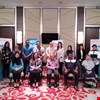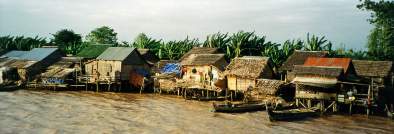


/ Southeast Asia
GWP-SEA Participated in the Indonesia Water Coalition’s 1st training on Good Water Stewardship & Water Fund
Indonesia Water Coalition was formed with a mission to improve water management in Indonesia. The Founding Members of the Coalition are Yayasan Aliansi Wali Sumber Daya Air Indonesia (Alliance for Water Stewardship Indonesia), PT Coca-Cola Indonesia, Danone Indonesia, Global Water Partnership Southeast Asia, PT Indofood Sukses Makmur, Yayasan Konservasi Alam Nusantara (The Nature Conservancy Indonesia), PT L'Oréal Indonesia, PT Multi Bintang Indonesia, PT Nestlé Indonesia, dan PT Unilever Indonesia. Following several discussions, the charter was signed through an online ceremony on the 29 January 2021. To show the coalition’s commitment, a number of events successfully held.
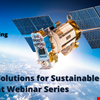
/ Southeast Asia
Innovative Solution for Sustainable Development Webinar Series
The 1st from the series focused on 'Monitoring ground & infrastructure movements from space' online webinar was held on 27 May 2021. The webinar was organized by GWP-SEA, in collaboration with Viromii and Detektia. Detektia S. L. is a spin-off of the Laboratory of Topography and Geomatics of the Civil Engineering School of the Universidad Politecnica de Madrid (UPM) and has been created with the aim of applying the DInSAR technique to problems of stability and maintenance of dams and road infrastructure. Detektia is a DInSAR based company that aspires to revolutionize the control and maintenance of large engineering works, helping to create safer, more efficient and more durable infrastructures.
/ Southeast Asia
World Water Day: Indonesia Water Coalition’s Afternoon Talk with the Founding Members (GWP-SEA)
World Water Day is an important milestone to raise the awareness of water security globally. The theme of World Water Day 2021 is valuing water. The value of water is greater than its price – water has enormous and complex value for our households, food, culture, health, education, economics and the integrity of our natural environment. Without a comprehensive understanding of water’s true, multidimensional value, it will be challenging to safeguard this critical resource for the benefit of people, environment, and economic development.
The Indonesia Water Coalition (IWC) that officially established through the charter signing ceremony on the 29 January 2021 sees World Water Day as an important milestone to achieve water security in Indonesia, which aligns with its vision. Since its establishment in January 2021, the coalition has been focusing on initiating multi-stakeholder collaboration to tackle the growing water challenges jointly. To leverage best practices from each company and organization, we are inviting the coalition’s founding members to share their commitments, achievements, and future-plans to the public via online sharing sessions between 22-31 March 2021. As one of the founding members, Fany Wedahuditama, Regional Coordinator for Global Water Partnership Southeast Asia (GWP-SEA) shared these discussion topic on the 29 March 2021.
/ Southeast Asia
GWP-SEA Engaged Private Sectors to increase IWRM implementation in Indonesia through Indonesia Water Coalition
By the end of 2018, GWP-SEA and the partners in Indonesia has successfully established a stepping stone to better-delivering water management through the formulation of a position paper on the inclusion of community-based water and sanitation program. Most of the recommendation was adopted by the new Water Bill that was enacted in 2019. Following this success, in 2020 GWP-SEA has further its collaboration with the private sectors in Indonesia to become one of the founding members of the Indonesia Water Coalition. To formalize the collaboration the charter signing ceremony was held.
/ Southeast Asia
Cambodia Water Partnership Engaged the Partners and Lead the Development of the Green Climate Fund Proposal
Cambodia Water Partnership (CambodiaWP) collaborated with the partners to develop a sound Green Climate Fund (GCF) application. The project proposal was the continuation of the Water, Climate, and Development Programme (WACDEP) started in 2018 aiming at the implementation of IWRM under the medium and long-term flood risks management planning in the Central Floodplain (CFP) of Cambodia.
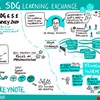
/ Southeast Asia
The PAN-ASIA SDG Learning Exchange on Monitoring and Reporting of SDG Indicator 6.5.1 Degree of Integrated Water Resources Management (IWRM) Implementation
In 2020, Global Water Partnership (GWP) in collaboration with The United Nations Environment Programme (UNEP) as the custodian agency, which coordinates reporting on SDG 6.5.1 indicator, together with UNEP-DHI Centre and Cap-Net, operates the SDG 6 IWRM Support Programme, to support 60 countries in implementing the survey. For the PAN Asia region, the reports have successfully submitted and it is now the time to find out the lesson learned behind the process.
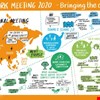
/ Southeast Asia
The EURASIA partners are ready to bring the change
The 2020 GWP Network Meeting concluded on 22 October, with over 900 GWP Partners signed up for the virtual event and others watching the Facebook Live feed (not covered the EURASIA ses-sion). The overall theme was ‘Bringing the Change’ in the context of the GWP 2020-2025 Strategy and as the world faces a pandem-ic. The session covers the global plenary session (Opening and closing) and 3 continental sessions; Latin America and Caribbean, EURASIA, as well as Africa and the Mediterranean.

/ Central Asia and Caucasus, China, South Asia, Southeast Asia
Result from the Asia Online Regional Workshop Supporting the Monitoring and Implementation of the SDG indicator 6.5.2 on Transboundary Water Cooperation
The Asia Region Online Workshop Supporting the Monitoring and Implementation of Sustainable Development Goal (SDG) indicator 6.5.2 on Transboundary Water Cooperation was successfully held virtually on 17 September 2020. GWP is one of the partners behind the workshop along with UN-ESCAP, UNESCO-IHP, and UNECE.
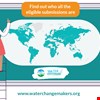
/ Southeast Asia
Updates from the water change maker awards
The Water ChangeMaker Awards was launched during the World Water Week, 22nd March 2020. The submission of an application was opened from 6 April and last until 14 June 2020, after extend-ed for one week. The award aims to make visible the teams and organizations that shape water decisions that build climate resili-ence – and to create and support a community of ChangeMakers who contribute and learn from each other in shaping the lessons learned about how to make positive change happen. The initiative is designed to make sure that everybody will benefit from oppor-tunities to Connect, Collaborate, and to Celebrate.
